Finding the right Business Opportunity (Biz Opp) affiliate network can significantly impact your earnings, especially as demand for online income opportunities continues to rise in 2026. Biz Opp networks connect affiliates with high-converting offers related to entrepreneurship, online business, side hustles, and financial freedom—making them a lucrative choice for both beginners and experienced marketers.
In this guide, we’ll explore the 10 best Biz Opp affiliate networks in 2026, highlighting their features, payouts, and why they stand out in today’s competitive affiliate landscape. Whether you want to monetize your blog, YouTube channel, or paid ads strategy, these networks can help you tap into one of the most profitable niches online.
Let’s dive in and find the perfect Biz Opp network to boost your earnings this year.
What is an Affiliate Network?
An affiliate network acts as a bridge between merchants looking to promote their products or services and affiliates who are eager to earn commissions by marketing those offerings. It serves as a platform where both parties can connect, collaborate, and track performance metrics.
In practical terms, when a merchant joins an affiliate network, they create an affiliate program that outlines the terms of engagement, including commission rates and promotional materials. Affiliates can browse through these programs and select those that resonate with their audience or niche. Once they join a program, affiliates receive unique tracking links that allow the network to monitor any sales or leads generated through their efforts.
The operational mechanics of an affiliate network involve several key functions:
- Matching Merchants with Affiliates: The network curates a list of available programs that affiliates can choose from based on their interests or audience demographics.
- Tracking Performance: Each time an affiliate promotes a product using their unique link, the network tracks clicks, conversions, and other relevant metrics.
- Payment Processing: Affiliate networks handle all financial transactions related to commissions, ensuring timely payments to affiliates based on their performance.
- Providing Resources: Networks often offer marketing materials such as banners, text links, and promotional content to assist affiliates in effectively promoting products.
Benefits for Businesses and Affiliates
The benefits of joining an affiliate network are manifold for both merchants and affiliates.
For Businesses:
- Cost-Effective Marketing: Affiliate networks operate on a performance-based model; businesses only pay commissions when sales are made or leads are generated. This minimizes upfront marketing costs.
- Access to Diverse Marketing Channels: By partnering with multiple affiliates across various industries or niches, businesses can broaden their reach without extensive marketing efforts.
- Simplified Management: Managing multiple affiliates directly can be cumbersome. An affiliate network centralizes this process, providing tools for tracking performance and managing payouts efficiently.
- Enhanced Brand Awareness: Affiliates often have established audiences that trust their recommendations. When they promote a product or service, it can significantly boost brand visibility.
For Affiliates:
- Variety of Options: Affiliates gain access to numerous programs across different industries, allowing them to choose products that align with their audience’s interests.
- Potential for Passive Income: By promoting products through various channels (blogs, social media), affiliates can create streams of passive income based on performance.
- Supportive Resources: Many networks provide training materials, marketing resources, and dedicated support teams to help affiliates succeed in their promotional efforts.
- Performance Tracking: Affiliates can easily monitor their performance through dashboards provided by the network, enabling them to optimize their strategies based on real-time data.
Overall, both parties benefit from the collaborative nature of affiliate networks, fostering growth opportunities in an increasingly competitive market.
Importance of Affiliate Networks in Business Opportunities
Affiliate networks play a crucial role in the modern business landscape, particularly for those seeking to expand their reach and enhance profitability. These networks serve as intermediaries that connect businesses (merchants) with individuals or entities (affiliates) who promote their products or services. By leveraging affiliate networks, businesses can tap into a vast pool of marketing resources without incurring significant upfront costs.
One of the primary advantages of affiliate networks is their ability to facilitate access to diverse marketing channels. Affiliates often have established audiences and platforms, allowing merchants to reach potential customers they might not have accessed otherwise. This partnership creates a win-win situation where affiliates earn commissions for successful referrals, while businesses benefit from increased visibility and sales.
Affiliate networks simplify the management of affiliate programs. They provide essential tools for tracking performance, managing payments, and ensuring compliance with agreed-upon terms. This streamlined approach enables businesses to focus on their core operations while leaving the complexities of affiliate management to the network.
The significance of affiliate networks extends beyond mere sales generation. They also contribute to brand awareness and credibility. When reputable affiliates promote a product or service, it enhances the merchant’s reputation and fosters trust among potential customers. This is particularly vital in industries where consumer trust is paramount.
Criteria for Selecting the Best Biz Opp Affiliate Networks
When considering which Biz Opp affiliate network to join or partner with as a business owner, several critical criteria should be evaluated:
Commission Structures
The commission structure is one of the most significant factors influencing both merchants’ profitability and affiliates’ earning potential. Different networks offer varying commission models:
- Pay-per-Sale (PPS): Affiliates earn a commission only when a sale is completed through their referral link.
- Pay-per-Lead (PPL): Affiliates receive compensation for generating leads—typically when users fill out forms or sign up for newsletters.
- Pay-per-Click (PPC): This model pays affiliates based on clicks generated through their links rather than completed sales.
It’s essential for both merchants and affiliates to understand these structures thoroughly before committing to a network. Merchants should consider what percentage they are willing to offer while ensuring it remains attractive enough for affiliates to promote actively.
Support and Resources
The level of support provided by an affiliate network can significantly impact its effectiveness:
- Training Programs: Many successful networks offer training sessions or resources that help affiliates understand best practices in promoting products effectively.
- Marketing Materials: Access to high-quality banners, email templates, and promotional content can enhance an affiliate’s ability to drive traffic and conversions.
- Dedicated Account Management: Some networks provide personal account managers who assist affiliates in optimizing campaigns and addressing any challenges they may encounter.
A well-supported network not only facilitates smoother operations but also empowers affiliates to maximize their potential earnings.
Reputation and Reliability
Selecting an affiliate network with a solid reputation is crucial for long-term success:
- Track Record: Researching reviews from other merchants and affiliates can provide insights into how well the network operates regarding payment timeliness and support responsiveness.
- Fraud Prevention Measures: A reputable network implements stringent measures against fraudulent activities like click fraud or unauthorized transactions.
- Transparency: Clear communication regarding commission structures, payment schedules, and program requirements fosters trust between merchants and affiliates.
Choosing a reliable network helps ensure that both parties maintain positive relationships while minimizing disputes related to payments or performance metrics.
10 Best Biz Opp Affiliate Networks in 2026
Here is the list of the top 10 best biz opp affiliate networks in 2026:
- ClickBank
- CJ Affiliate
- ShareASale
- Rakuten Marketing
- FlexOffers
- Amazon Associates i
- Avangate
- Impact Radius
- Awin
- eBay Partner Network
1. ClickBank
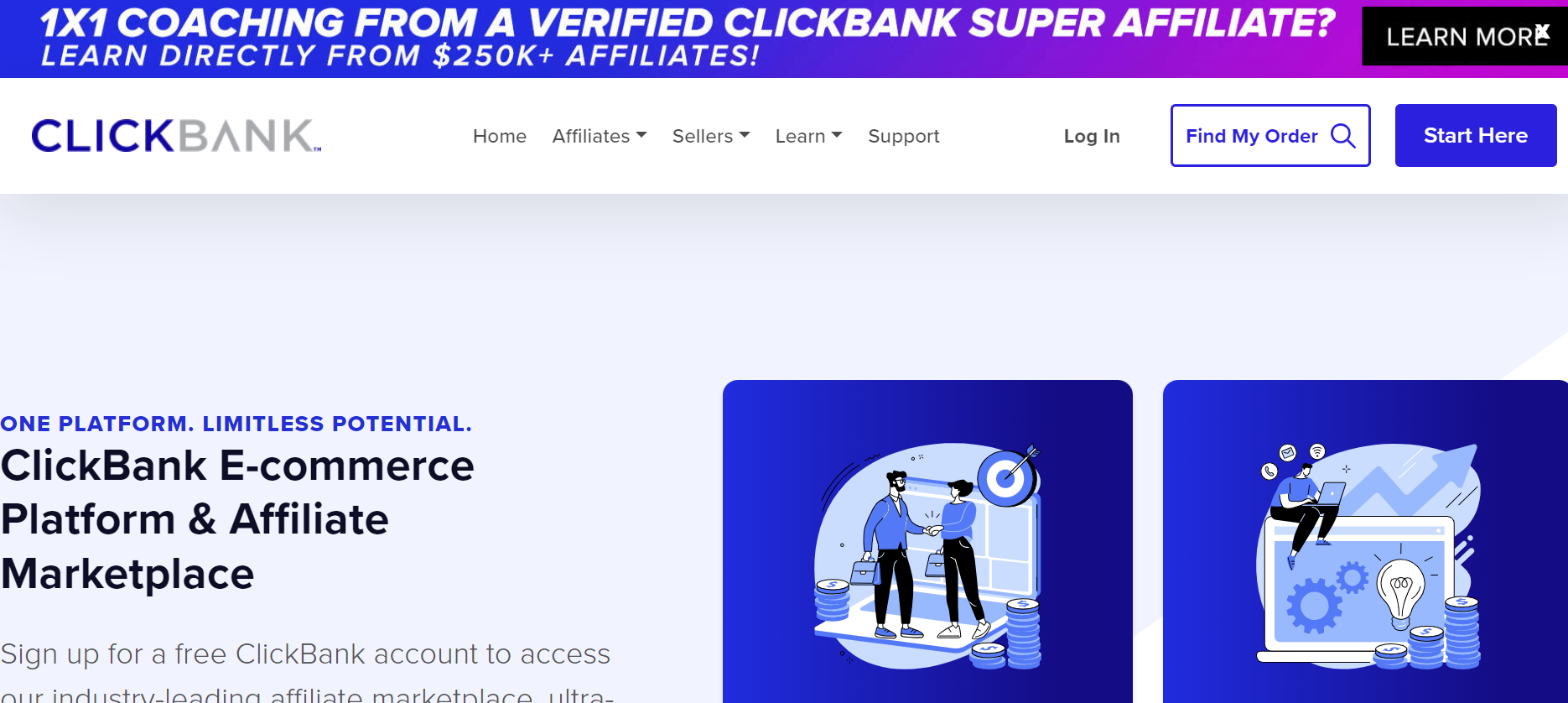
ClickBank is a well-established digital marketplace that connects product creators with affiliates looking to promote their offerings. Founded in 1998, it specializes in digital products such as e-books, software, and online courses. Affiliates can easily browse a vast array of products and select those that align with their audience. ClickBank provides a user-friendly interface, allowing affiliates to generate unique tracking links effortlessly.
Key features include:
- High Commission Rates: Affiliates can earn commissions ranging from 50% to 75%.
- Recurring Commissions: Many subscription-based products offer ongoing earnings for affiliates.
- Marketplace Statistics: Affiliates can access detailed sales data to inform their marketing strategies.
- Diverse Product Categories: ClickBank hosts thousands of products across various niches.
Pros and Cons
Pros:
- High Earnings Potential: The commission rates are significantly higher than many other affiliate networks.
- Ease of Use: The platform is beginner-friendly, allowing new affiliates to start promoting quickly.
- No Approval Process: Affiliates can promote most products without needing prior approval from sellers.
Cons:
- Quality Variability: The open nature of the marketplace means some products may not meet high-quality standards.
- Market Saturation: With numerous affiliates promoting similar products, standing out can be challenging.
- Fees for Dormant Accounts: Affiliates who do not make sales over a period may incur fees.
2. CJ Affiliate (Commission Junction)

CJ Affiliate, formerly known as Commission Junction, is one of the largest affiliate marketing networks globally. It connects advertisers with publishers and offers a wide range of products across various industries. CJ provides robust reporting tools and a comprehensive dashboard for tracking performance metrics.
Key features include:
- Diverse Advertiser Base: Access to thousands of advertisers across multiple sectors.
- Advanced Reporting Tools: Detailed analytics help affiliates optimize their campaigns.
- Customizable Links: Affiliates can create tailored links for specific campaigns.
Pros and Cons
Pros:
- Reputable Advertisers: Many well-known brands are part of the CJ network, enhancing credibility.
- Comprehensive Support: Offers extensive resources and support for affiliates.
- Flexible Payment Options: Multiple payment methods are available for affiliates.
Cons:
- Approval Process Required: Some programs may require approval before affiliates can promote them.
- Complex Interface: The dashboard can be overwhelming for beginners due to its extensive features.
- Lower Commission Rates on Some Products: Compared to platforms like ClickBank, some commission rates may be less attractive.
3. ShareASale

ShareASale has been in operation since 2000 and is known for its user-friendly interface and diverse range of affiliate programs. It caters to various niches, including fashion, health, and technology. ShareASale provides affiliates with access to numerous tools to enhance their marketing efforts.
Key features include:
- Wide Variety of Products: Affiliates can choose from thousands of merchants across different categories.
- Real-Time Reporting: Access to real-time data allows affiliates to track their performance effectively.
- Affiliate Tools: ShareASale offers banners, text links, and other promotional materials.
Pros and Cons
Pros:
- Diverse Merchant Options: A broad selection of products allows affiliates to find suitable offerings easily.
- User-Friendly Dashboard: The interface is intuitive, making it easy for newcomers to navigate.
- Reliable Payments: ShareASale is known for timely payments to its affiliates.
Cons:
- Limited International Merchants: Most merchants are based in the U.S., which may limit opportunities for international affiliates.
- Some Programs Require Approval: Certain merchants may have an application process that could delay promotion.
- Lower Commission Rates in Some Niches: Some categories may not offer competitive commission rates compared to others.
4. Rakuten Marketing

Rakuten Marketing is a global affiliate marketing network that connects brands with publishers. It emphasizes building long-term relationships between advertisers and affiliates. Rakuten offers a wide range of tools that help both parties maximize their marketing efforts.
Key features include:
- Global Reach: Access to international brands allows affiliates to target diverse markets.
- Advanced Analytics Tools: In-depth reporting helps affiliates understand their performance metrics better.
- Custom Solutions for Brands: Tailored solutions help brands optimize their affiliate strategies.
Pros and Cons
Pros:
- Strong Brand Partnerships: Collaborations with reputable brands enhance trustworthiness.
- Robust Support System: Offers extensive resources for both advertisers and publishers.
- Innovative Technology Solutions: Advanced tools help improve campaign effectiveness.
Cons:
Complex Setup Process: New usilability may vary by location, affecting options for certain affiliates.
- ers may find the initial setup challenging due to the platform’s complexity.
- Higher Minimum Payout Thresholds: Affiliates must reach higher earnings before receiving payments.
- Limited Product Categories in Some Regions: Ava
5. FlexOffers
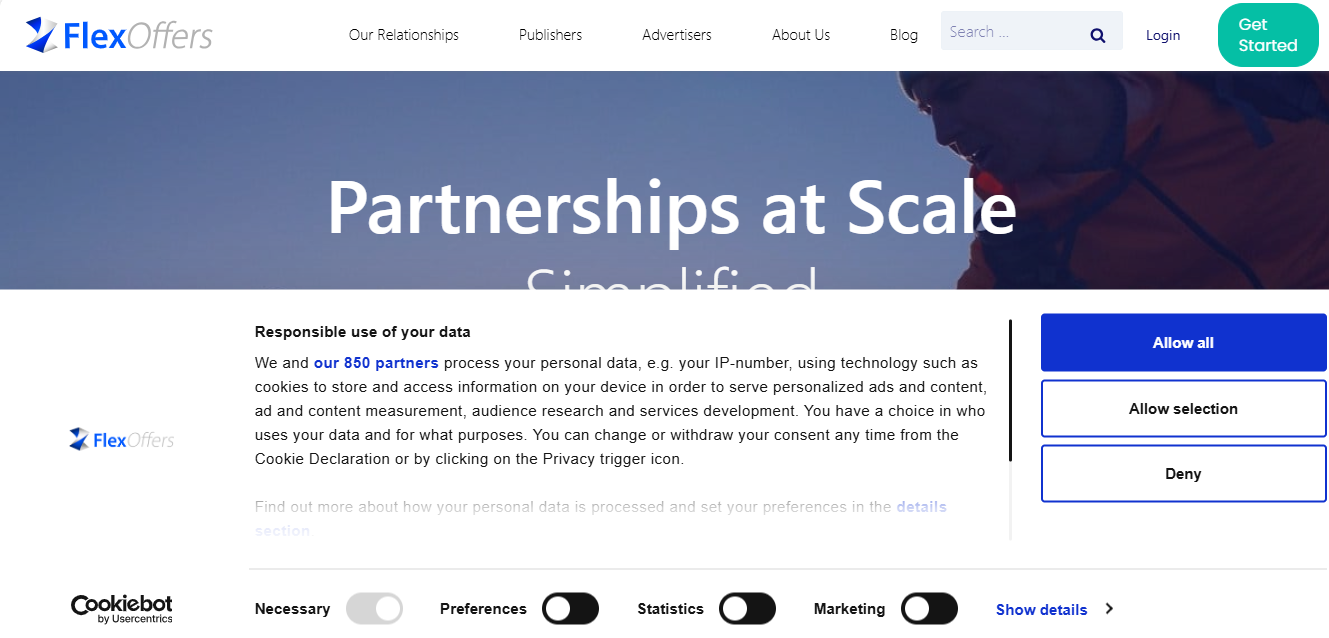
FlexOffers is an affiliate marketing network that provides access to a wide range of advertisers across various industries. It offers an extensive catalog of products for affiliates to promote while focusing on building strong partnerships between brands and publishers.
Key features include:
- Diverse Product Selection: Thousands of merchants available across multiple niches.
- Real-Time Reporting Tools: Affiliates can track clicks, conversions, and commissions instantly.
- Dedicated Support Team: FlexOffers provides personalized assistance to its affiliates.
Pros and Cons
Pros:
- Broad Range of Advertisers: FlexOffers hosts numerous well-known brands, providing ample promotion opportunities.
- User-Friendly Interface: The platform is designed for ease of use, making it accessible for all skill levels.
- Regular Payments: Known for reliable payment schedules.
Cons:
- Approval Required for Some Programs: Certain merchants may require approval before affiliates can promote their products.
- Limited International Options: While growing, the number of international advertisers is still limited compared to domestic options.
Commission Rates Vary Significantly by Merchant: Not all offers provide competitive commission structures.
6. Amazon Associates
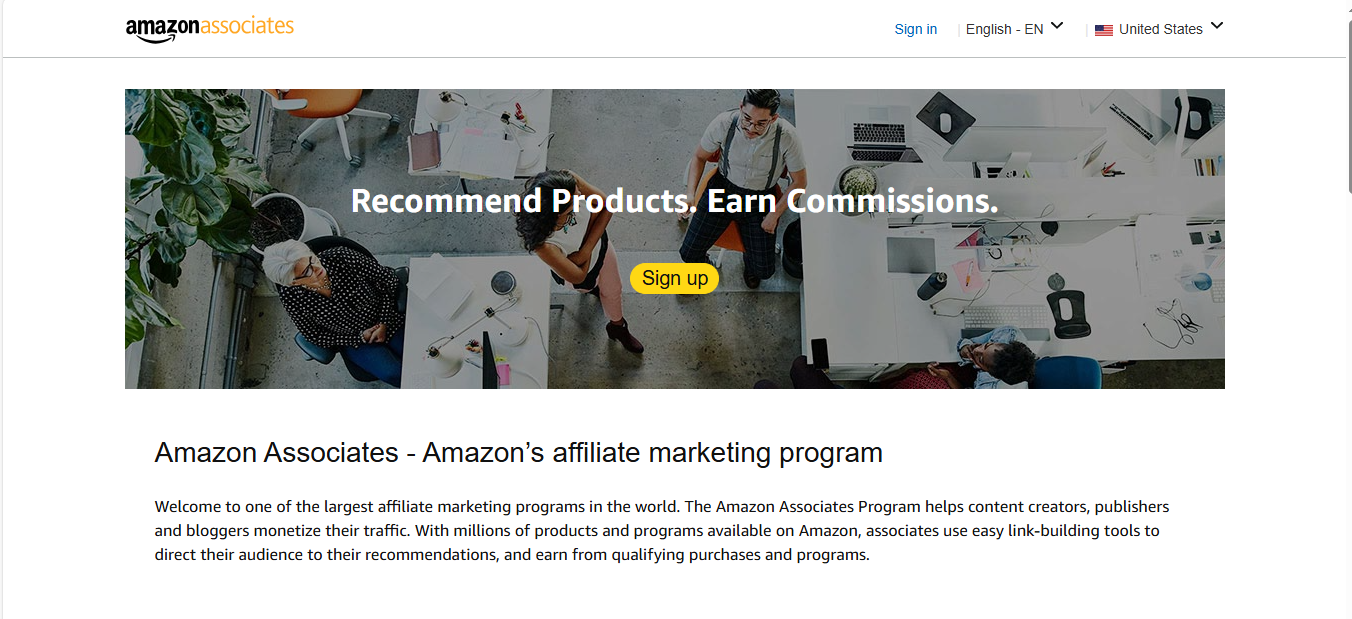
Amazon Associates is one of the most recognized affiliate programs globally. It allows affiliates to promote millions of products available on Amazon.com. With its vast selection, it caters to nearly every niche imaginable.
Key features include:
- Extensive Product Range: Affiliates can choose from millions of items across various categories.
- Easy Link Creation Tools: Simple tools allow quick generation of affiliate links for any product on Amazon.
- Trustworthy Brand Recognition: Amazon’s reputation enhances conversion rates among potential customers.
Pros and Cons
Pros:
- High Conversion Rates: Amazon’s established trust leads to higher sales conversion among consumers.
- Variety of Promotional Tools Available: Banners, widgets, and link options make promotion versatile.
- Regular Payments with Multiple Options: Affiliates receive payments through direct deposit or gift cards.
Cons:
- Lower Commission Rates Compared to Others (1%-10%): Commissions are lower than many other affiliate networks due to Amazon’s pricing strategy.
- Strict Operating Rules: Affiliates must adhere closely to Amazon’s guidelines or risk account suspension.
- Short Cookie Duration (24 hours): Commissions are only earned if purchases occur within a day after clicking the link.
7. Avangate
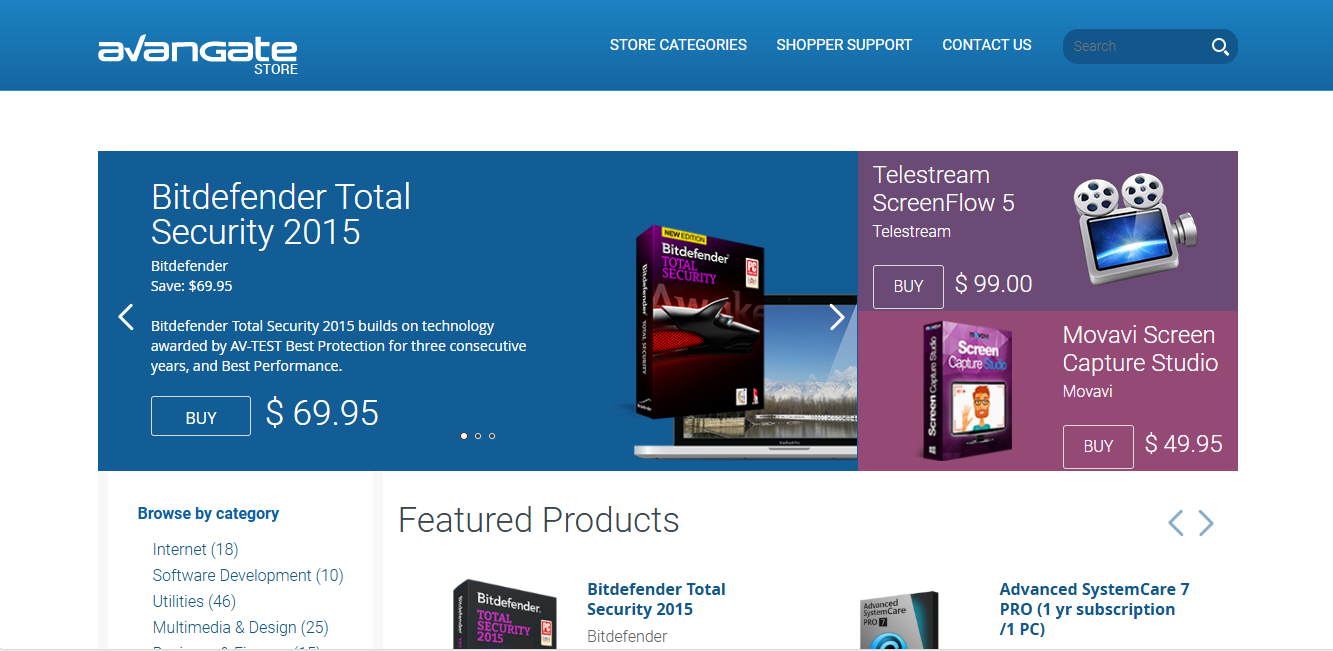
Avangate specializes in digital goods such as software applications and online services. It caters primarily to software vendors looking for effective ways to reach customers through affiliate marketing. Avangate provides tools designed specifically for digital product promotion.
Key features include:
- Focus on Software Products: Ideal for promoting software solutions or digital services effectively.
- Recurring Revenue Opportunities: Many software products offer subscription models that provide ongoing commissions.
- Comprehensive Analytics Dashboard: Affiliates have access to detailed reports on performance metrics.
Pros and Cons
Pros:
- High Commission Rates on Software Sales: Typically, higher than physical product commissions due to lower overhead costs associated with digital goods.
- Specialized Support for Software Vendors: Tailored resources help software companies maximize their affiliate strategies effectively.
Cons:
- Niche Focus May Limit Options: Primarily focused on software means fewer options outside this category for affiliates interested in broader markets.
8. Impact Radius
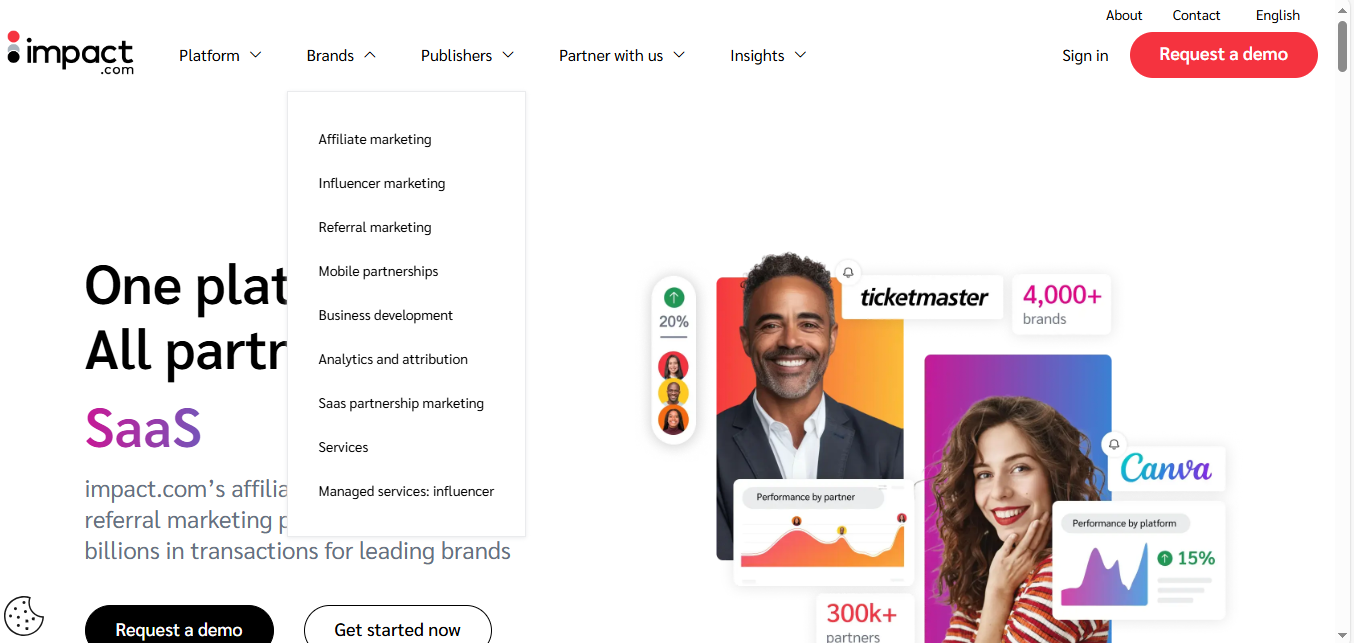
Impact Radius is an advanced partnership management platform that focuses on optimizing relationships between brands and their partners. It offers robust tracking capabilities along with comprehensive analytics tools that provide insights into campaign performance.
Key features include:
Advanced Tracking Technology: Provides detailed insights into customer behaviour across multiple channels.
Pros and Cons
Pros:
- Comprehensive reporting tools allow marketers to analyse performance deeply,
- Strong focus on optimizing partnerships leads to improved ROI,
Cons:
- Higher learning curve due to advanced features,
- Pricing structure may be less accessible for smaller businesses or individual marketers,
9. Awin
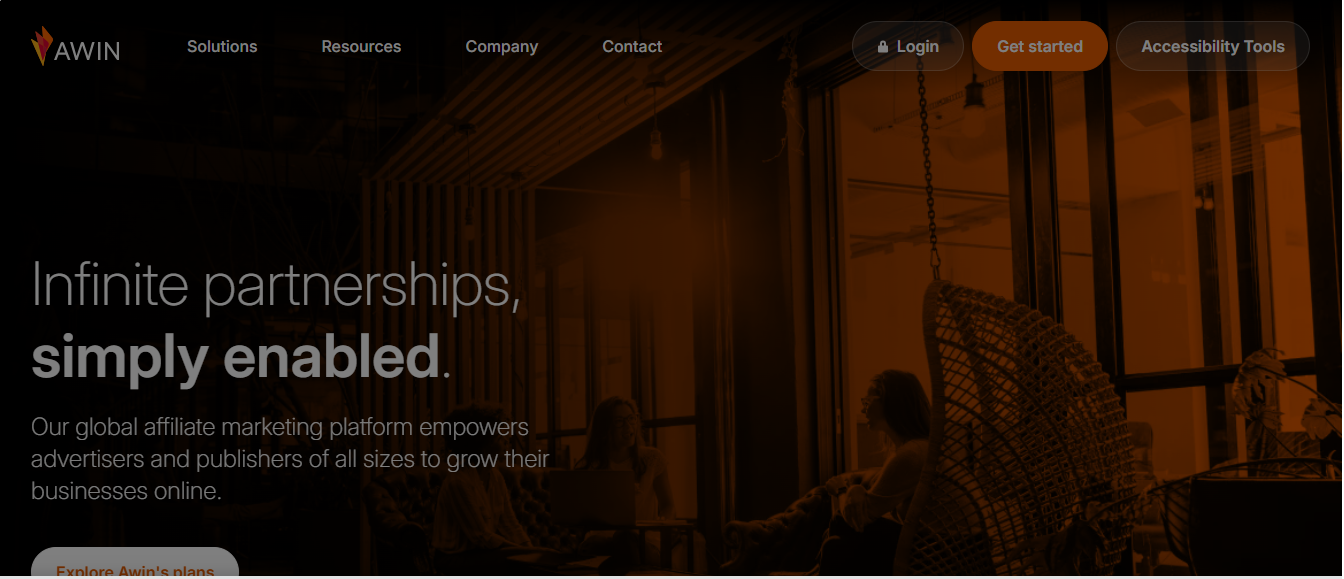
Awin is a global affiliate marketing network that connects brands with publishers worldwide. It covers various sectors including retail, travel, finance, and telecommunications. Awin emphasizes building strong relationships between advertisers and affiliates through innovative technology solutions.
Key features include:
- Extensive network with thousands of global advertisers.
- User-friendly dashboard providing real-time analytics.
Pros and Cons
Pros:
- Strong international presence allows access to diverse markets.
- Reliable payment processes ensure timely earnings.
Cons:
- Some programs require approval which might delay promotions.
- Higher minimum payout thresholds compared to competitors.
10. eBay Partner Network
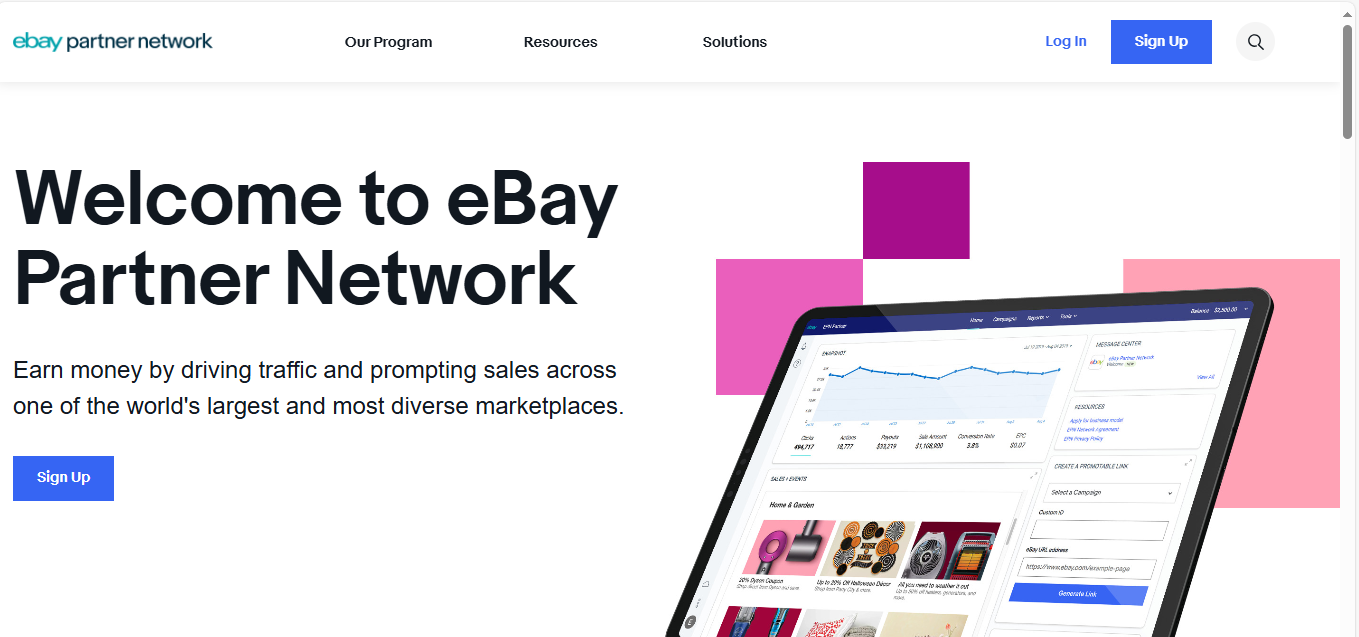
The eBay Partner Network allows individuals or businesses to earn commissions by promoting eBay listings. With millions of active listings available at any time, it provides a vast array of products across numerous categories making it appealing for many marketers.
Key features include:
- Access to millions of listings across diverse categories.
- Flexible promotional options including banners or custom links.
Pros and Cons
Pros:
- High conversion rates due to eBay’s established reputation.
- Wide variety of products available increases potential earnings.
Cons:
- Lower commission rates compared to specialized affiliate networks.
- Competition among partners can make it challenging for new affiliates.
How to Get Started with Affiliate Marketing
Getting started with affiliate marketing can be an exciting venture, especially within the context of the best Biz Opp affiliate networks. The process involves several steps that can set you on the path to success while maximizing your earning potential. Below are detailed steps to join an affiliate network and tips for succeeding in this competitive field.
Steps to Join an Affiliate Network
Choose Your Niche
The first step in your affiliate marketing journey is selecting a niche that interests you. This could be anything from health and wellness to technology or finance. A well-defined niche helps you target a specific audience, making your marketing efforts more effective.
Research Affiliate Networks
Once you have a niche, research various affiliate networks that align with your interests. Popular Biz Opp networks include ClickBank, CJ Affiliate, ShareASale, and Rakuten Marketing. Each network has different strengths, product offerings, and commission structures.
Sign Up for an Affiliate Network
After selecting a network, visit their website and complete the registration process. Most networks require basic information such as your name, email address, and payment details. Some may also ask for your website or social media profiles if applicable.
Explore Available Programs
Once registered, browse through the programs offered by the network. Look for products that resonate with your niche and audience. Pay attention to commission rates, cookie durations, and promotional materials available.
Apply to Affiliate Programs
Many networks require you to apply to specific affiliate programs within their platform. This may involve submitting your website or social media links for review. Ensure that your platforms have quality content that aligns with the products you wish to promote.
Receive Unique Affiliate Links
Upon approval into an affiliate program, you will receive unique tracking links for the products you intend to promote. These links are crucial as they track sales and ensure you receive commissions for any sales generated through your referrals.
Create Quality Content
Start creating engaging content that incorporates your affiliate links naturally. This could be blog posts, videos, or social media posts that provide value to your audience while promoting the products.
Promote Your Content
Share your content across various platforms where your target audience spends time. Utilize social media channels like Instagram, Facebook, or TikTok, as well as email newsletters or forums related to your niche.
Monitor Performance
Regularly check the performance of your affiliate links using the analytics tools provided by the network. This data will help you understand what works and what doesn’t, allowing you to refine your strategies over time.
Optimize and Scale
Based on performance insights, optimize your content and marketing strategies for better results. Consider scaling by exploring additional affiliate programs or expanding into new niches as you gain experience.
Tips for Success in Affiliate Marketing
Build Trust with Your Audience
Authenticity is key in affiliate marketing. Always promote products that you genuinely believe in and that provide value to your audience. Building trust will lead to higher conversion rates.
Focus on Quality Over Quantity
Rather than promoting numerous products at once, focus on a few high-quality offerings that align well with your niche. This targeted approach can improve engagement and sales.
Utilize SEO Strategies
Implement search engine optimization (SEO) techniques in your content creation process to increase visibility on search engines like Google. Use relevant keywords related to your niche and ensure that your content is informative and engaging.
Leverage Social Media
Use social media platforms effectively to reach a broader audience. Create engaging posts that highlight the benefits of the products you promote and encourage followers to check them out through your affiliate links.
Stay Updated on Trends
Keep yourself informed about industry trends within your niche as well as changes in affiliate marketing strategies. Subscribe to relevant blogs, podcasts, or newsletters that provide insights into successful practices.
Engage with Your Audience
Interact with your audience through comments or direct messages on social media or blog posts. Addressing their questions or concerns can foster a sense of community and loyalty among followers.
Experiment with Different Formats
Try different content formats such as videos, infographics, or podcasts to see what resonates best with your audience. Diversifying content types can attract different segments of viewers.
Track Your Results Regularly
Use the analytics tools provided by your affiliate network to track clicks, conversions, and earnings regularly. This data will help you identify successful strategies and areas needing improvement.
Network with Other Affiliates
Join forums or groups where other affiliates share their experiences and tips for success in the industry. Networking can provide valuable insights into effective strategies and potential partnerships.
Be Patient and Persistent
Success in affiliate marketing typically doesn’t happen overnight; it requires time and effort to build a following and generate income consistently. Stay committed to learning and improving over time.
Conclusion
In the dynamic world of affiliate marketing, choosing the right Biz Opp affiliate network is essential for success. By carefully selecting a network that aligns with your niche and offers strong support, you can maximize your earning potential while building trust with your audience.
As you embark on your affiliate marketing journey, remember to focus on quality content, engage with your followers, and continuously optimize your strategies. Exploring the various networks mentioned can open up exciting opportunities and help you thrive in this competitive landscape. Embrace the process, stay committed, and watch your efforts translate into meaningful results.
Frequently Asked Questions (FAQs)
What is an affiliate network?
An affiliate network is a platform that connects advertisers (merchants) with affiliates who promote their products or services in exchange for commissions on sales generated through their referrals.
How do I choose the right affiliate network?
When selecting an affiliate network, consider factors such as commission rates, product offerings relevant to your niche, support resources available for affiliates, and overall reputation within the industry.
Can I join multiple affiliate networks?
Yes! Joining multiple affiliate networks can diversify your income streams by allowing you access to various products across different niches while maximizing earning potential through multiple partnerships.
